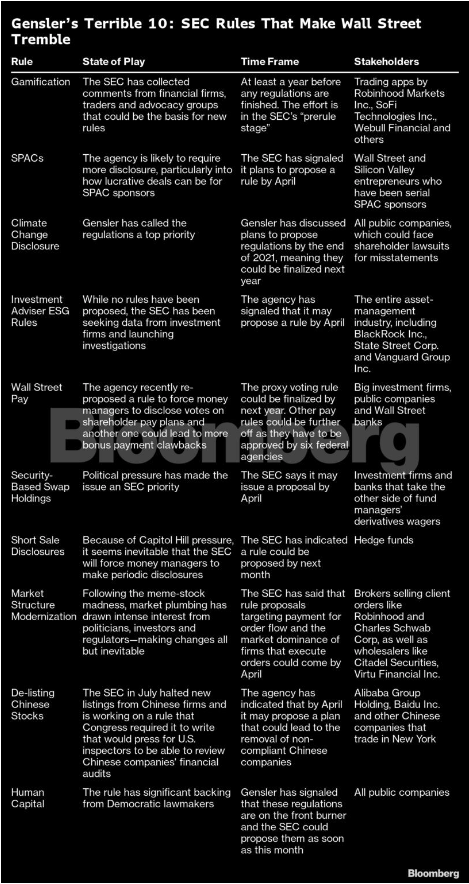The joke in Washington is that Gary Gensler could inspire his own version of the game, “Drink Every Time...”
The rules: Down a shot every time the U.S. Securities and Exchange Commission chief says he’s “asked the staff” to consider new regulations.
Gensler has “asked the staff” about oversight for crypto—drink. For online brokers—drink. For green investment funds—drink. During two recent congressional hearings, Gensler used the phrase no fewer than 30 times, enough, one lobbyist quipped, to induce alcohol poisoning.
But for Wall Street, Gensler’s plans are hardly something to laugh about. He’s laying out one of the most ambitious agendas in the SEC’s 87-year history—some 49 proposals, many already drawing opposition from hedge funds, stock exchanges, online brokers and public companies. He’s been similarly aggressive on agency enforcement cases, which can tank share prices, spur fines and trigger embarrassing publicity.
Gensler, an ex-Goldman Sachs Group Inc. executive whose earlier Washington experience includes a hard-fought battle against big banks to bring oversight to the vast derivatives market, says he’s confident the SEC can move ahead on many issues at once. In an interview, he added that he sometimes thinks of the famous Martin Luther King Jr. speech about the “fierce urgency of now” when it comes to the regulator’s agenda.
The frenetic pace has some SEC veterans, and even Gensler’s supporters, worried that he may be so overextended that he ultimately fails to get much accomplished. They wonder if he’s leading the commission into a morass of politicking, lawsuits and even a rebellion by the regulator’s unionized workers. Many are asking: how will Gensler pull this off?
“You have to think it will be quite a challenge for the SEC staff to achieve,” said Frank Kelly, a former agency official who now runs Fulcrum Macro Advisors, a Washington policy research firm.
Many Priorities
A few Democrats and outside advisers have urged Gensler, 63, to narrow his scope to a more manageable load. The policies he’s advocating, they argue, may take years to complete and have prompted powerful corporate interests to start discussing strategies for suing the SEC.
For his part, Gensler insists he has no priorities because everything is at the top of the list. “Don’t ask me about my three daughters and which one I spend more time with,” he said.
There is plenty of action inside the agency. Gensler has set up some 50 teams involving about 200 people to write rule proposals. Each has staff from the general counsel’s office as well as economists to carefully weigh the costs and benefits, a key requirement of federal law. He is keeping close tabs on the progress; the groups have been directed to send regular updates to the chair’s office on the state of play.
Gensler also faces political pressures. The Biden administration and congressional Democrats—two constituencies he doesn’t want to disappoint—are keenly interested in particular policies, especially a pending SEC rule that would address climate change through more-robust corporate disclosures.
Lawmakers’ other priorities include reining in special-purpose acquisition companies, or SPACs, responding to this year’s implosion of family office Archegos Capital Management and getting a handle on the unchecked growth of cryptocurrencies.

Wild Trading
One area vexing Wall Street is Gensler’s pledge to overhaul the equity market’s plumbing in response to this year’s meme-stock mania. The wild trading has prompted several congressional hearings and put firms, including Robinhood Markets Inc. and Citadel Securities, on edge because new regulations could hurt their lucrative businesses.
Executives who’ve met with SEC officials have been privately cautioned that the market structure rules being developed may be extreme, according to people familiar with the matter.








